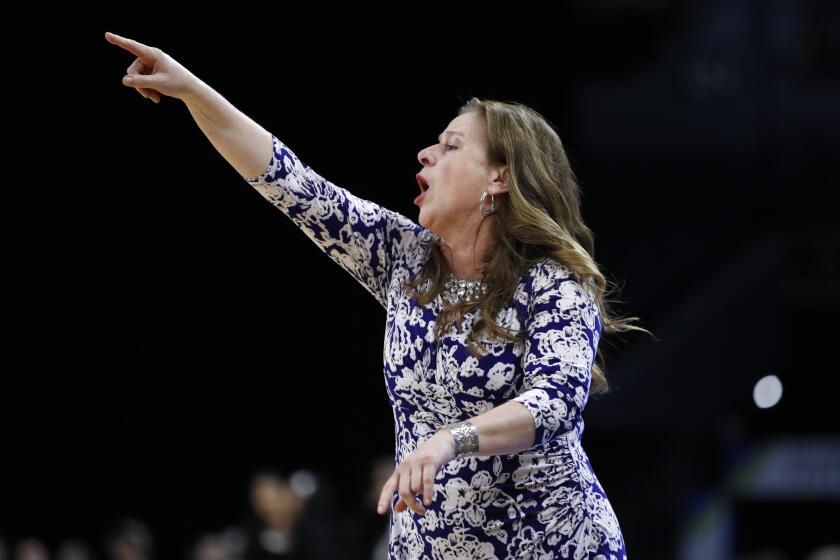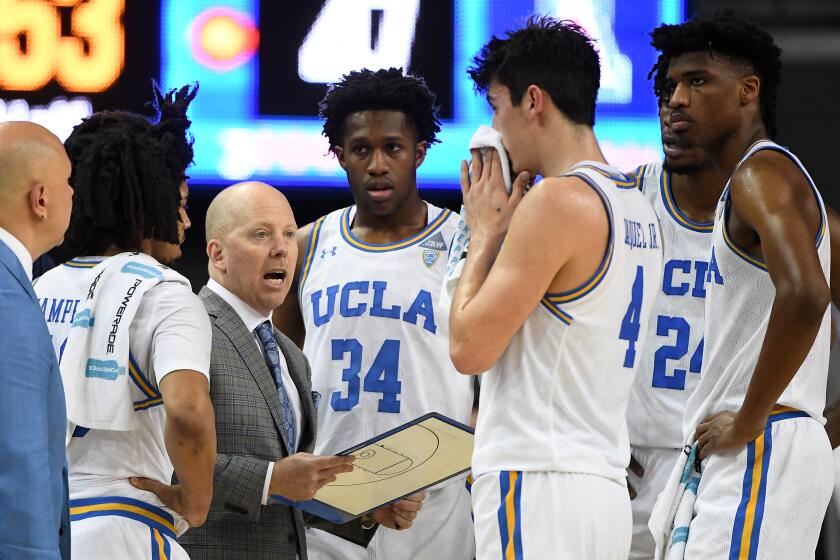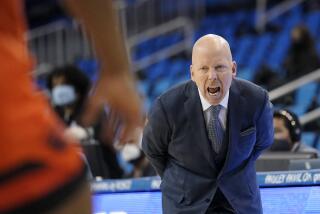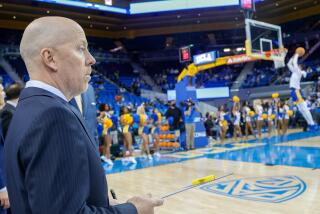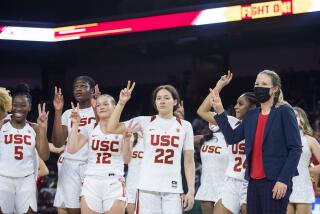No shining moments: NCAA basketball tournaments are canceled for the first time
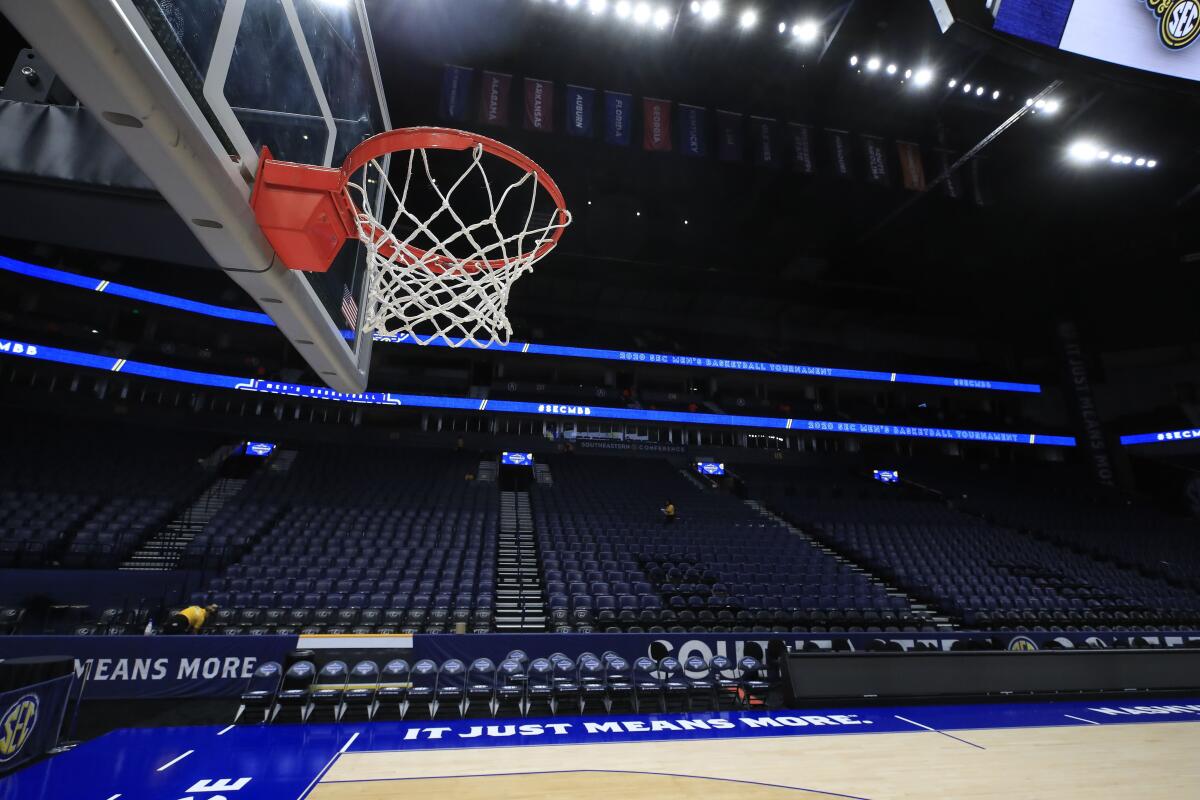
- Share via
The final hours of the college basketball season started with a two-paragraph news release.
An hour and a half before the opening game of the American Athletic Conference tournament in Fort Worth, Texas, the conference canceled the four-day event because of the coronavirus outbreak. The Big Ten Conference canceled its tournament minutes later. The Southeastern Conference, Pac-12 and a slew of other conferences did the same in a day without parallel.
The NCAA capped Thursday’s frantic series of events by canceling its tournament for the first time in the event’s 81 years.
“There was no reasonable way to go forward with the tournament,” said Jay Bilas, the ESPN college basketball analyst who played for Duke. “Nobody had a choice. The NCAA had the obligation to be a responsible global citizen and do its part to slow the spread of the virus.”
The decision, coming after the NBA, MLB, NHL and other professional sports leagues suspended their seasons, brought an abrupt end to the month-long tournament typically filled with Cinderellas, shining moments and busted brackets that’s a fixture in American life.
Less than 24 hours earlier, the NCAA had taken the unprecedented step of barring fans from the tournament and planning to play games in empty arenas. Several conferences had done the same and closed their locker rooms in an attempt to limit the spread of the coronavirus. But the Ivy League, which drew criticism for canceling its tournament Tuesday, had been the lone conference to take such a drastic step.
The UCLA women’s basketball team’s season came to a premature end when the NCAA announced the cancellation of the men’s and women’s tournaments.
The equation changed Wednesday night when Rudy Gobert of the NBA’s Utah Jazz tested positive for the coronavirus and the NBA immediately suspended its season.
“In view of what happened with the NBA, and in view of the progressive nature of this virus and the pandemic nature and the fact that the curve is still unfortunately going up,” Mike Aresco, the AAC commissioner, told reporters Thursday, “and the fact that you could have a situation where, you know, evidence showed up afterwards of a student-athlete having this and a lot of other student-athletes could potentially be exposed, we felt the risk was not worth it …”
A half-dozen conferences, led by the AAC, canceled their tournaments in a 20-minute span.
USC senior Jonah Mathews woke up fellow senior Nick Rakocevic in their Las Vegas hotel room with the Big Ten tournament news.
“I was like, ‘Wow, that means that’s it for us?’ ” Rakocevic recalled. “He said, ‘You think so?’ And I was like, ‘Bro, give it an hour. They’re going to cancel this, too.’ ”
USC assistant Jason Hart tweeted a few minutes later: “If other conferences aren’t playing why are we?!” At the same time, first reports surfaced that the Pac-12 was canceling its tournament.
By the time the flurry of statements and news conferences ended, all 58 Division I men’s games and 24 Division I women’s games scheduled for Thursday — and scores more in the coming days — had been canceled. The speed of the developments created awkward and unexpected situations across the country.
Before Thursday’s games at the Atlantic Coast Conference tournament in Greensboro, N.C., commissioner John Swofford told reporters the games would continue as scheduled.
“There’s risk in every path you take with something like this,” he said.
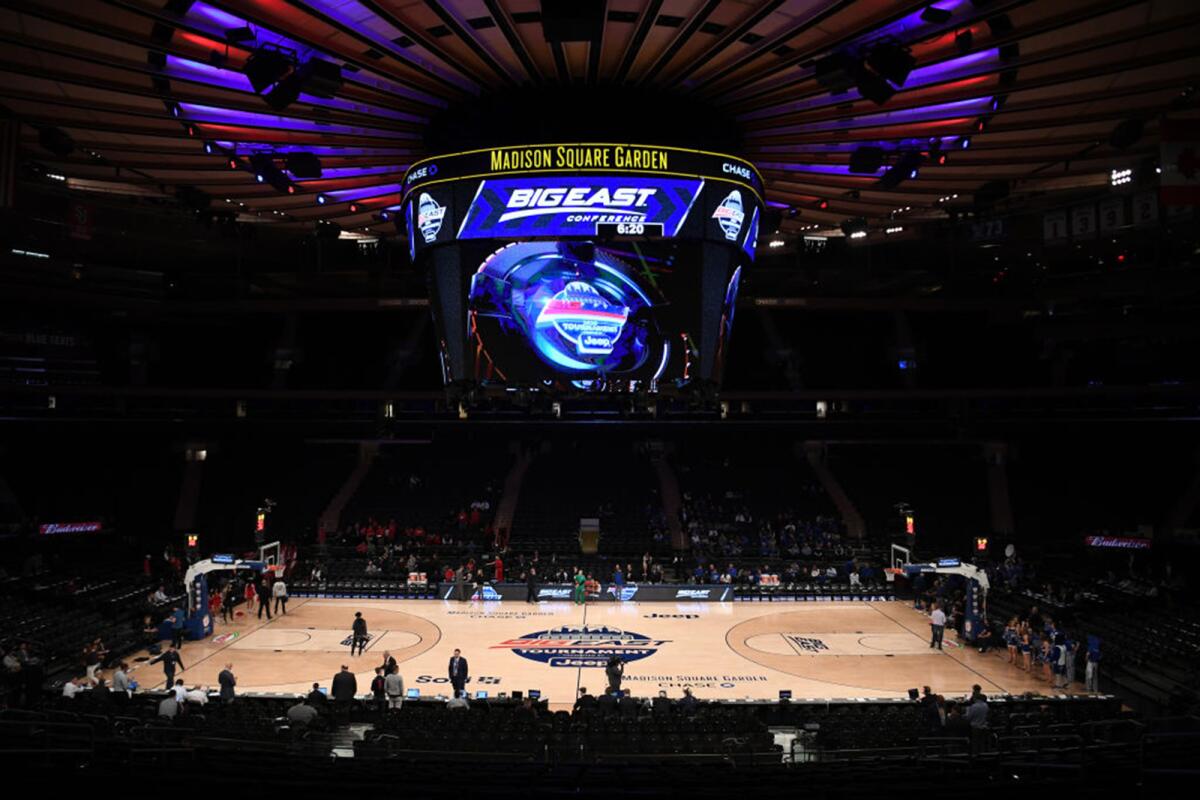
The direction changed a couple of hours later, after a discussion involving conference presidents and athletic directors. The tournament was canceled. Swofford referred to an “extraordinarily fluid situation” with changing information. Florida State coach Leonard Hamilton, whose team won the regular season and had been scheduled to play Clemson in a quarterfinal, accepted the championship trophy in an empty arena.
Adding to the growing feeling that the NCAA tournament couldn’t be conducted after so many cancellations, Duke, home to the 10th-ranked team in the country, issued a statement suspending all athletic competition. One of the most storied programs in the country had, in effect, pulled out of the tournament.
“We emphatically support the decision,” basketball coach Mike Krzyzewski said.
The Big East was the last major conference to cancel its tournament, doing so at halftime of the St. John’s-Creighton game at Madison Square Garden in New York. Val Ackerman, the Big East commissioner, told reporters the conference allowed the game to continue because “we didn’t feel like we needed a dramatic, pull the players off the court in the middle of the game gesture.”
Zach Bohannon, who played for Wisconsin in the 2014 Final Four, was driving to Indianapolis to watch his brother Jordan play for Iowa in the Big Ten tournament.
“They keep thinking this evolving situation would get better, but obviously it has not and will continue to get worse,” Zach Bohannon said of the NCAA. “Playing in the Final Four is a heck of an experience, but it should never come at the risk of the student-athletes who are playing the game.”
The NCAA remained silent, at least publicly, as the cancellations poured in. The most recent news release on the organization’s media site for several hours Thursday concerned an enforcement matter.
The parent of one player whose team would be a high seed in the women’s tournament noted each cancellation and worried her daughter, who has a preexisting health issue, would be forced to travel for March Madness games as the coronavirus spreads.
“It’s absolutely been crazy,” said the mother, who spoke on the condition she not be identified because of the sensitivity of the situation. “I just pray. … I don’t want her around anything like that.”
The questions about the NCAA’s next move ended at 1:16 p.m., four-and-a-half hours after the conference tournament cancellations started.
Cori Close, coach of UCLA’s 10th-ranked women’s team, got the news on her smartphone.
“The NCAA tournament is canceled,” she said, her voice shaking and face flushing with disappointment.
Mick Cronin, the first-year UCLA men’s coach and the Pac-12 coach of the year, learned of the cancellation from a reporter’s text message shortly after the team’s plane landed in Los Angeles.
The Pac-12 men’s basketball tournament, and all other conference sporting events, have been canceled amid the growing coronavirus outbreak.
“The plane literally just landed and messages were just coming through,” Cronin said.
Not only did the NCAA cancel the men’s and women’s basketball tournaments, but all remaining winter tournaments and all spring tournaments.
“This decision is based on the evolving [coronavirus] public health threat, our ability to ensure the events do not contribute to spread of the pandemic, and the impracticality of hosting such events at any time during this academic year given ongoing decisions by other entities,” the NCAA’s statement said.
The decision that seemed more inevitable with each passing hour Thursday brought relief, disappointment and confusion among a variety of reactions that mirrored the country’s dawning realization that the coronavirus will disrupt some of our most loved events.
“It’s painful, it’s disappointing for so many players and coaches,” Bilas said. “There are so many stories that are heart-wrenching in this. But it all pales in comparison to the global pandemic. … We can all quarrel over the timing, but ultimately the NCAA did the right thing.”
Times staff writers Ben Bolch, Ryan Kartje and Thuc Nhi Nguyen contributed to this article.
More to Read
Go beyond the scoreboard
Get the latest on L.A.'s teams in the daily Sports Report newsletter.
You may occasionally receive promotional content from the Los Angeles Times.
